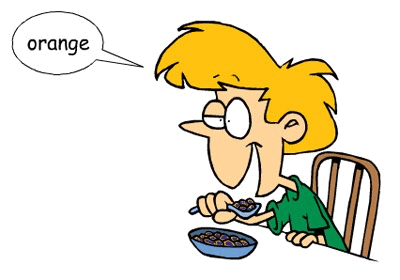26.3 Metonymical Extension Example #2
Sometimes a response may occur in a situation in which there appears to be no appropriate stimulus present. For example, a young boy may often have had an orange for breakfast. He may sit down one morning when there is no orange on the table and still say “orange.” Responses are not controlled by the absence of something, so we must find some aspect of the current situation that is controlling the response. Skinner accounts for the tendency to say “orange” in this example by suggesting that all of the other features of the breakfast table can also gain some control over the response.
Metonymical Extension
An instance of verbal behavior with the following features:
The response form has already been acquired in one or more of the elementary verbal relationships
The stimulus must be novel
The novel stimulus must have none of the relevant features of the class of stimuli that previously controlled the response
